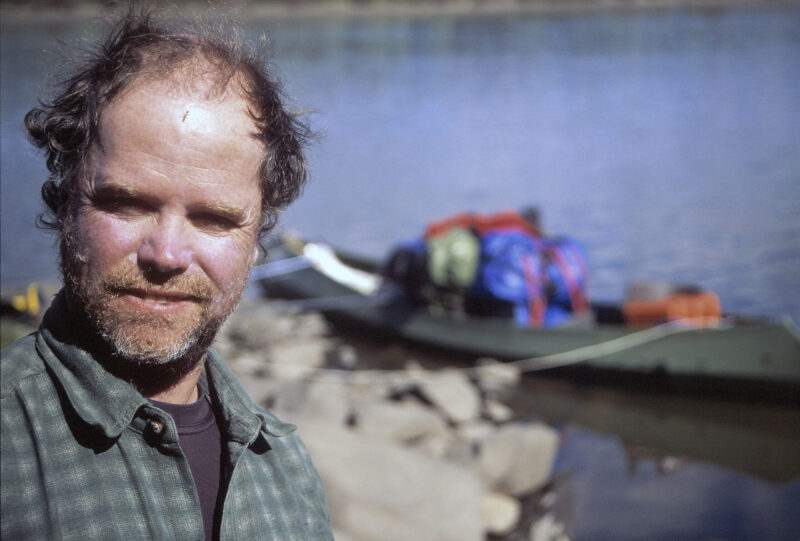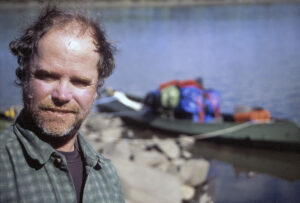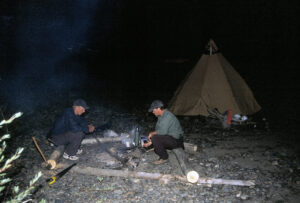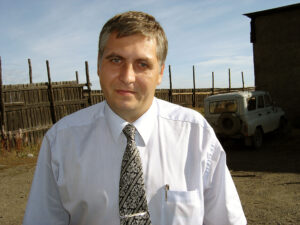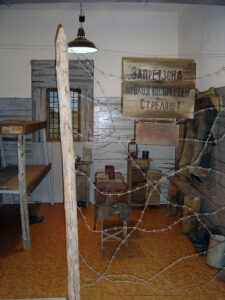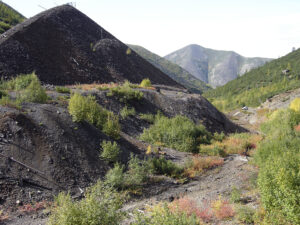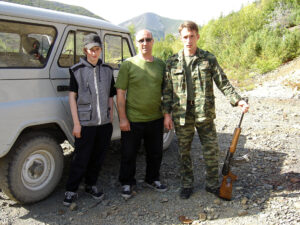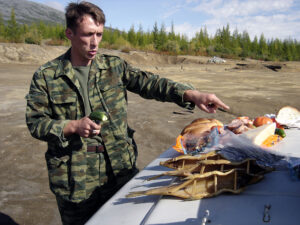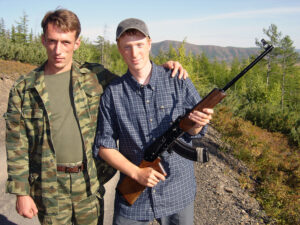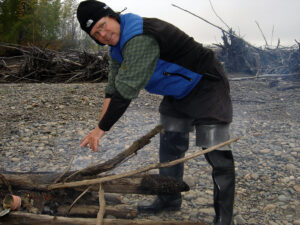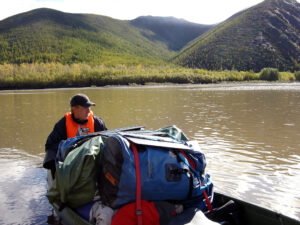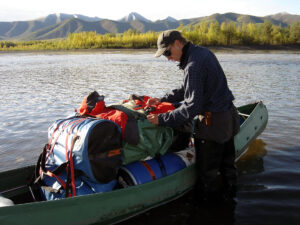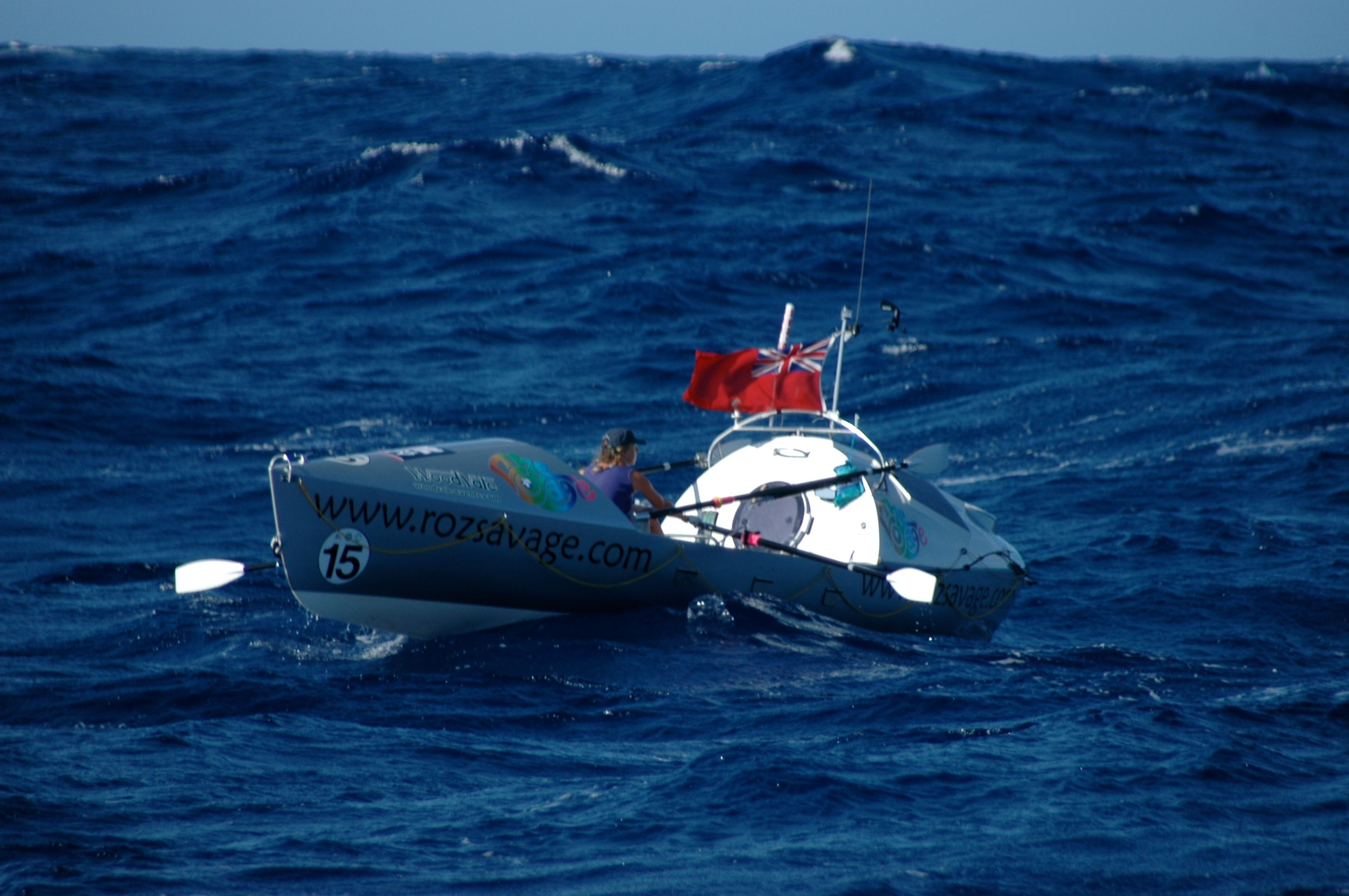20 years since the Siberian Expedition:
The settlement of Seimchan, 2nd of September 2004, overcast and cold, with a smell of snow in the air at N 62 degrees 53’11.7 E 152 degrees 24’56.8. We’re staying in a small guesthouse, the only one in the settlement, at what is called Upper Seimchan.
Seimchan as such doesn’t differ much from the other tiny settlements we’ve passed along the Kolyma, (ok then, in reality only one, Sinegorje, the two others we floated passed very slowly, but we still saw a lot!) an outer area dominated by abandoned and ruined industries, rusty machinery, lots of small unstable cottages in wood, with windows covered by plastic or wooden boards, all of them with small tidy gardens and often, a bunch of ducks or chicken, a few scared, aggressively barking dogs, people who stroll around seemingly without direction, mainly young people with crew cuts, an abandoned airfield, half constructed living blocks surrounded by rusted machinery. Once one gets into the center of the settlement, one meets the communal blocks in white, two- or three storied, all of them close to falling apart, plenty already empty, most of them with plastic or wooden boards covering the windows, garbage in every corner and car wreckages spread all over the place and there’s no definite center. Maybe around the Administration Building where the local bosses find ways to survive and plan for a healthier future. This is where you find most of the local shops, to be found in run down buildings, but once inside they’re modern and the shelves are full of products to buy. It’s around the shops where you meet people. Most of them avoid looking at you initially, even though it stinks foreigner of us, up until that moment when you stop one of them to ask a question and suddenly you have a friend! People change dramatically and quickly become helpful, generous, funny and warm, just as we have become accustomed to how they are. With the best of people I’ve come across, no doubt. They’re cold and hard on the outside, but soft and warm on the inside. Pretty much like back home in Sweden. This is the way it all started during our visit, I stopped a police guy when we arrived at the almost abandoned harbor, 6 km:s from the center.
I stopped one of these guys that I had been warned about before leaving, a policeman. They were supposed to be corrupt, difficult to do with and only interested in giving us uncountable problems. So far, they’ve been just like the rest, great. The same applied to Konstantin. He took a break in his work, drove me into Seimchan and the administrative building, where he called all people of power in the settlement until he eventually found one of the three top names, Ruslan. He was dressed in a business mans suit, slightly overweight, in his early thirties and he drove me back to the harbor in a dodgy Lada. He was initially slightly reserved, but once back at the harbor he found the owner and his sons and then we all together carried all our weight up to the boardinghouse he had fixed for us. Then he explained:
”I know you have come to help us and that you’re friends of Shparo. (Dmitry Shparo is our great contact here in Russia, visit his website at www.shparo.com ) Get ready, we’ve fixed you a car with driver who’s going to drive you to three of Stalin’s Gulags, which are located not far from here. The chief of the Tourist department will take care of you.”
It wouldn’t surprise if the Tourism Department was fairly new…The chief, Mikhailov, turned out to be a few years older than young Johan, he was kind and humorous, careful with his image, dressed and camouflage, like most men here on their free time, he carried a loaded Kalashnikov with a very sensitive trigger, since he was a hunter he explained and added that the area we would visit, was infested with brown bear. He would do well in a contest regarding who’s most macho! The driver, Sasha, was typical of the men in the area. Solidly built, with well used and big hands, a weather bitten face and a cautious manner until you became his friend. He had brought his son, also named Sasha, he was supposed to be an expert in English. He started off immediately in English:
”I am Sasha.”
One of two sentences in English he used on our excursion. The other one was Goodbye.
”Do you want vodka?” asked the Chief of Tourism, when we set of in a high speed in the jeep that dominates the vehicles of the region, the OAS.
We said no. Therefore he bought 4 beers instead, to relish during our drive. First we visited the local museum, which they had opened just for us. Once inside, Ruslan turned up again, to translate. He spoke 22 words of English and 13 in German and since our Russian probably is on the same level, we understood quite a lot of what was told.
This was our second visit to a Museum during our visit in the region. They’re all quite similar. Definitely worth a visit, even though they’ve got a long way to go, if they’re going to inspire the local youth to visit. One part is dedicated to the local history, described with photos and statues, remembering local heroes from the past. Another part is dedicated to showing off a bunch of badly stuffed animals, the local fauna, than another, unfortunately always the smallest section, the one regarding the native people of the region. In this case they had some great objects showing the yugahirs, which are part of our mission to find. On top of that, a major part is dedicated to the local history regarding its industrialisation. I have to say, all things summed up, it gave us a lot of important background to the area and its history. And two cups of sweet and hot Russian cups of tea! The local history is quite dark, though, which we realized a couple of hours later when we’ve made our way through an overgrown road to three remains of Stalin’s work camps, the Gulags. Terrible, inhuman places where the mad dictator killed at least 3.5 million people in the most brutal ways. More about this in the Gulag-dispatch to come.
The guide Mikhail, was more interested in talking about hunting and fishing and therefore he rushed us through the remains. It was extremely important for him to show us some fresh bear pooh we’ve passed on the way. On top of that, he’d been ordered to return us back to Seimchan before 6 p.m. when we’d been invited to have a sauna together with the people in charge of Seimchan. Still, even though we where stressed for time, he managed to serve us a meal to be remembered forever. Smoked fish, meat, fresh vegetables, vodka and a lot of other delicious he’d hunted or caught himself. That is the way people are here. Incredibly generous, one never feels that it is done to gain favors, but due to that they’re proud to be able to be generous.
We got picked up at 7 p.m. sharp to have a banja, not a sauna. A major difference is that the banja is much hotter! The banja is important in peoples life. It isn’t only one of few places where you can get steaming hot water, it is also the place we’re people socialize and gossip. There’s two types of banjas, the communal ones and the private ones. We visited a communal one in Magadan. A gigantic institution full of showers for lots of people at the same time, a variety of tempered baths and a big, extremely hot sauna. Average temperature 120 degrees Celsius! In Seimchan we visited a private one, owned by one of the local hotshots, Victor. You can imagine the sensation we felt, not having enjoyed hot water for a month! What I liked the best though, what differs from the saunas we have back home, is that little room people have just outside the sauna where they socialize. They bring good food, drinks and snacks, and then you sit there for many hours, talking about matters one wouldn’t talk about generally. We learned a lot about the present Russia seen out of the eyes of young, intelligent Siberians. Another thing I noticed, was that they didn’t only use birch to whip themselves their blood to move, but also pine. Gee, how nice! And, when the temperature had reached maximum, one could stick a felt hat on he head to avoid melting ones brain halves.
One thing is for sure, I am going to turn our sauna at home into a banja!
